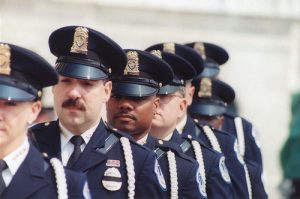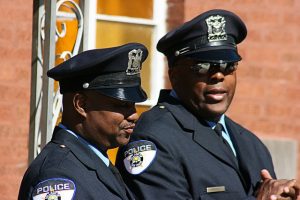To protect and serve: it’s the motto of the brave men and women who choose to be police officers.
 Last week veteran police detective Jason Weiland was tragically killed in the line of duty, shocking the residents of rural Wisconsin, as well as his fellow law enforcement officers throughout the nation. Weiland’s death is yet another reminder of the dangers our brothers and sisters in blue face every single day.
Last week veteran police detective Jason Weiland was tragically killed in the line of duty, shocking the residents of rural Wisconsin, as well as his fellow law enforcement officers throughout the nation. Weiland’s death is yet another reminder of the dangers our brothers and sisters in blue face every single day.
The majority of officers enter the profession with the highest ideals of justice clear in their minds. they strive to keep their communities safe and act as a buffer between criminals and good citizens.
At some point, every police officer realizes there will always be an element of darkness in society, no matter how well he or she performs their duty. And at some point, it becomes clear that the duty they have sworn to undertake is so much more – physically and psychologically – than they may at first have believed it would be.
While the benefits to being a police officer are many, there are also drawbacks. Unlike other jobs, the hours are always changing. Shifts can alternate and be back to back with little notice. A cop’s family life is never on a set schedule.
 In terms of actual pay scale, most departments are not in the upper echelons of career choices. There are a few exceptions in the form of affluent community police forces or those of incorporated villages, but these positions are limited and rarely available. Most cops work a highly dangerous job for what may seem like insufficient pay.
In terms of actual pay scale, most departments are not in the upper echelons of career choices. There are a few exceptions in the form of affluent community police forces or those of incorporated villages, but these positions are limited and rarely available. Most cops work a highly dangerous job for what may seem like insufficient pay.
The job is dangerous, make no mistake. Every traffic stop or domestic call is one fraught with uncertainty and peril. There is no way to ascertain beforehand the mental states of those they will encounter. This can include armed individuals or wanted criminals determined not to return to jail. In these cases, the arriving law enforcement personnel are seen as an enemy that must be dealt with quickly.
Talk about a hostile work environment!
 As a public servant, a police officer’s every action is subject to scrutiny after the facts, often by people who have never been in situations of peril and have no way of visualizing the split second decisions one needs to make to survive such encounters. It is easy for well-meaning but uninformed members of the public to point fingers later on at what was seen as excessive action on the part of police officers engaged in a dangerous encounter. Few understand the reality of being there.
As a public servant, a police officer’s every action is subject to scrutiny after the facts, often by people who have never been in situations of peril and have no way of visualizing the split second decisions one needs to make to survive such encounters. It is easy for well-meaning but uninformed members of the public to point fingers later on at what was seen as excessive action on the part of police officers engaged in a dangerous encounter. Few understand the reality of being there.
Which leads to one of the most powerful influences on members of the police forces in the U.S.: psychology and public opinion. Each time a case of excessive force makes the news, ALL members of the team bear the burden; even those with sterling records feel the smudge on their morale. It’s one of the things never spoken of by those hurling accusations.
Add to this the fact that some groups have recently started to target police officers, gangland style, and you can see the heavy burden on the backs of the men and women in blue. They must be on constant guard with every encounter; a fine balancing act between etiquette and staying alive.
My hat is forever off to those who serve and protect us every day.
Adam Quirk is an accomplished criminal justice professional with over 15 years of experience in the field. Adam has advanced degrees in Criminal Justice and Business Administration. Adam Quirk enjoys blogging and traveling internationally whenever he has the chance.
